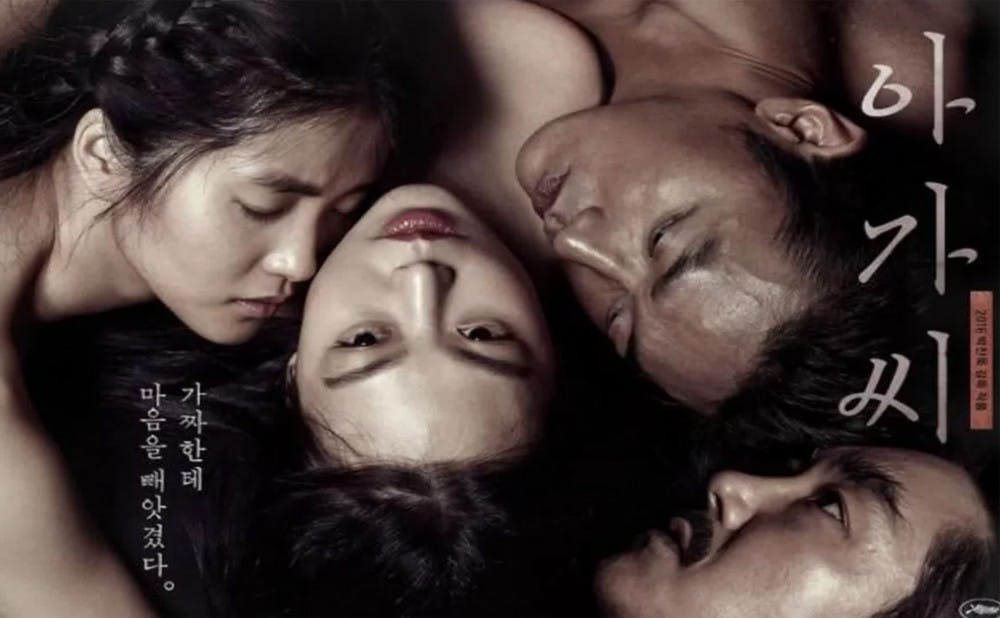When filmmakers François Truffaut and Jean-Luc Godard burst onto the French cinematic scene in the 1950s, they brought more than the French New Wave with them; they gave birth to a theory known as auteurism. Translated into English as ‘authorship,’ the theory stipulates that a director can create a style that is uniquely his or her own, lending to an array of films that undoubtedly belong to a single artist.
Although director Park Chan-Wook claims that he is not an auteur, there are certain aspects of his films that render them discernibly distinguishably his. A viewer can almost always be guaranteed heavy themes of revenge, darkly humorous dialogue and more twists and turns than an amusement park ride when watching a Chan-Wook film. His latest movie, “The Handmaiden,” is no exception—it’s a sensual tale of deception that lets Chan-Wook’s style shine.
“The Handmaiden” pulls its story from “Fingersmith,” a 2002 novel written by Sarah Waters, but Chan-Wook changes the setting from Victorian Britain to Korea under Japanese colonial rule. Sook-Hee, a young woman raised by con artists and pickpockets, is selected by a conman using the false title of Count Fujiwara to aid him in an elaborate scheme. She is to become the maid to Lady Hideko, a quiet and troubled heiress, and persuade her to fall in love with Count Fujiwara so that he can marry her, steal her fortune and throw her into an insane asylum when all is said and done.
But there’s a problem: Sook-hee and Hideko fall in love with each other. Through stolen glances and tender moments laden with sexual tension, director Park Chan-Wook navigates their burgeoning relationship in the subtlest and most convincing ways. They share intimate, fleeting moments, building in ferocity to a literal climax that solidifies their bond and complicates the con job even further.
However, this is not a film that grounds itself in romanticism; it is, at its core, an examination of the patriarchy and how women can reclaim their agency in a world dominated by men. Hideko is forced by her Uncle Kouzuki, a collector of antique erotica, to read sexually explicit material to older men in hopes that they’ll purchase a piece of his collection. There’s a striking, beautiful scene wherein Sook-hee, in a fit of contempt at Kouzuki’s merciless treatment of Hideko, destroys all of his erotic novels. It’s an incredible, emotional representation of the two women demolishing the male authority which has entrapped them for their entire lives.
Chan-Wook does an even better job of exploring this idea of women rebuking male dominance through the lens of a unique narrative, largely untouched by the conventional cinematic portrayal of lesbians. Whereas films such as “Carol” and “Blue Is the Warmest Color” are emotional, slow-burning stories about women grappling with and accepting their homosexuality, “The Handmaiden” never attempts to examine the titular characters’ feelings about their sexual desires. Sook-hee and Hideko are in love and there’s really nothing else to it—no pain or tumult tagging along, weighing down a narrative that otherwise allows the two women to have stories that lie outside of their sexuality.
Of course, “The Handmaiden” is enticing for more reasons than just its portrayal of women and their sexual endeavors. The story is deftly told in three parts, each one with differing narration and perspectives, and the plot twists are brilliant, the film doubling back on itself as more information is uncovered. It’s a refreshing progression, one that begs multiple viewings because of its intricacies. Perhaps this is one of its greatest shortcomings, though—at times, the plot becomes so complex that it is difficult to follow, although the catch-up is easy.
The cinematography and direction are fairytale-like, beautiful in their own right. Wide pans of a body swaying from a looming cherry blossom tree, close-up shots of Hideko seductively licking a lollipop and voyeuristic angles captured through peep holes and windows – every frame is painstakingly composed. The film’s perfection is at times cloying, deliberately reflective of the women’s stifled and suffocating environment.
While “The Handmaiden” might not necessarily be the best film of 2016, it is certainly the most alluring and striking. In an industry that lacks adequate LGBT+ representation, Park Chan-Wook inserts his explorative take on lesbian romance with his refined style, creating a narrative film that’s more than its main characters’ sexualities. “The Handmaiden” is dark, funny, bizarre and provocative—proof that Chan-Wook works best when exploring the confines of his auteurship.
Get The Chronicle straight to your inbox
Signup for our weekly newsletter. Cancel at any time.

